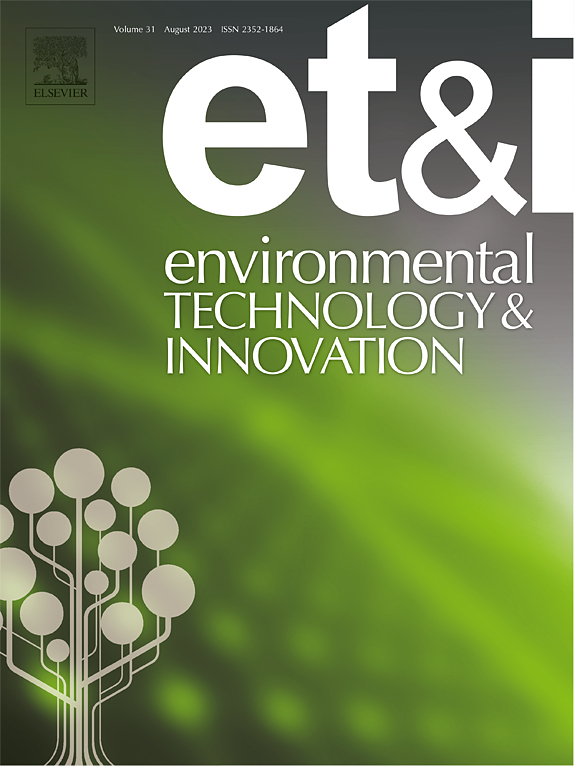利用本地联合芽孢杆菌进行重油生物降解和土壤生物修复
IF 7.1
2区 环境科学与生态学
Q1 BIOTECHNOLOGY & APPLIED MICROBIOLOGY
引用次数: 0
摘要
重油污染物的快速生物降解仍然是油污染土壤生物修复的主要挑战。利用含有芽孢杆菌的菌群是一种很有前途的清理污染土壤的策略。本研究旨在培养稠油降解菌群,并评价其生物降解性能和生物修复潜力。从新疆克拉玛依油田废水和油泥中分离筛选出4株重质油降解芽孢杆菌(S1 ~ S4)。初步鉴定S1为耐盐芽孢杆菌,S2和S6为枯草芽孢杆菌,S4为副苔藓芽孢杆菌。通过4个菌株的自由组合,形成了5个菌落。两个联合体(S1 +S2 +S4和S1 +S2 +S6)表现出较好的稠油降解和重金属萃取效率。30天后,细菌联合体对重油的降解率高达34.5% %,显著高于单菌株的最高效率(20% %)。菌群对铁(87.9% %)、钒(46.0% %)和镍(60.0 %)的萃取效率均高于单菌株(72.7 %、31.6 %和56.2% %)。在模拟的生物修复实验中,高达35.3% %的总石油烃是利用细菌联合体从油污泥中提取的,其中长链正构烷烃的效率特别高(C20-C26: 59.1% %;C28-C32: 61.1 %)。本研究表明,本地联合芽孢杆菌在降解油泥中的重油和石油烃方面表现优异,在土壤生物修复方面具有很大的应用潜力。本文章由计算机程序翻译,如有差异,请以英文原文为准。
Leveraging indigenous Bacillus consortia for heavy oil biodegradation and soil bioremediation
Fast biodegradation of heavy oil contaminants remains a major challenge in the bioremediation of oil-contaminated soil. The use of bacterial consortia containing Bacillus species is a promising strategy for cleaning up contaminated soil. The aim of this study was to develop heavy oil-degrading indigenous bacterial consortia and evaluate their biodegradation performance and bioremediation potential. Four heavy oil-degrading Bacillus strains (designated S1 to S4) were isolated and screened out from oilfield wastewater and oil sludge samples collected in the Karamay Oilfield in Xinjiang, China. S1 was tentatively identified as B. halotolerans, S2 and S6 as B. subtilis, and S4 as B. paralicheniformis. Five consortia were developed through free combination of the four strains. Two consortia (S1 +S2 +S4 and S1 +S2 +S6) showed high efficiencies of heavy oil degradation and heavy metal extraction. Up to 34.5 % of heavy oil was degraded using bacterial consortia after 30 days, which was notably higher than the maximum efficiency of single strains (20 %). The greatest extraction efficiencies of bacterial consortia for iron (87.9 %), vanadium (46.0 %), and nickel (60.0 %) were greater than those of single strains (72.7 %, 31.6 %, and 56.2 %, respectively). In a simulated bioremediation experiment, up to 35.3 % of total petroleum hydrocarbons were from oil sludge using bacterial consortia, with particularly high efficiencies for long-chain n-alkanes (C20–C26: 59.1 %; C28–C32: 61.1 %). This study demonstrates the outstanding performance of indigenous Bacillus consortia in degrading heavy oil and petroleum hydrocarbons in oil sludge, with great application potential for soil bioremediation.
求助全文
通过发布文献求助,成功后即可免费获取论文全文。
去求助
来源期刊

Environmental Technology & Innovation
Environmental Science-General Environmental Science
CiteScore
14.00
自引率
4.20%
发文量
435
审稿时长
74 days
期刊介绍:
Environmental Technology & Innovation adopts a challenge-oriented approach to solutions by integrating natural sciences to promote a sustainable future. The journal aims to foster the creation and development of innovative products, technologies, and ideas that enhance the environment, with impacts across soil, air, water, and food in rural and urban areas.
As a platform for disseminating scientific evidence for environmental protection and sustainable development, the journal emphasizes fundamental science, methodologies, tools, techniques, and policy considerations. It emphasizes the importance of science and technology in environmental benefits, including smarter, cleaner technologies for environmental protection, more efficient resource processing methods, and the evidence supporting their effectiveness.
 求助内容:
求助内容: 应助结果提醒方式:
应助结果提醒方式:


